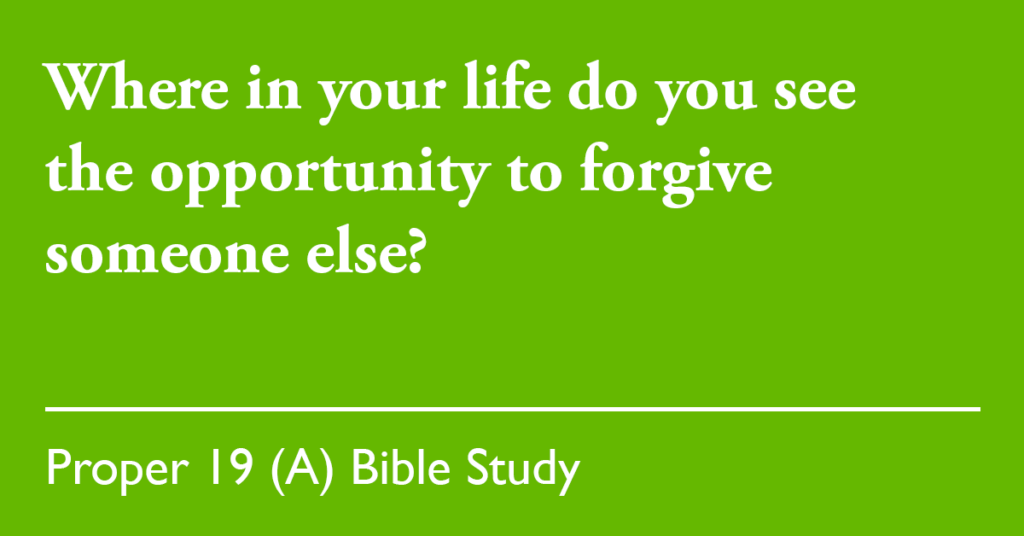This page is available in: Español
Bible Study: Proper 19 (A) – 2023
September 17, 2023
RCL: Exodus 14:19-31; Psalm 114 or Exodus 15:1b-11,20-21; Romans 14:1-12; Matthew 18:21-35

Exodus 14:19-31
Who went into the Red Sea first?
According to Jewish midrash (a narrative interpretation that is meant to stand alongside Scripture – think Ancient Near Eastern fanfiction), the sea did not automatically part for the people of Israel when they came to it. They were at a standstill: the sea before them and the Egyptians behind. No one moved.
No one, that is, except for Nahshon. He walked (or, according to some sources, jumped!) into the sea; it wasn’t until he was in over his nose that the waters parted.
This raises the age-old question: Where does God’s work end and ours begin? Perhaps the parting of the sea was not a foregone conclusion. Perhaps God was waiting for a human partner to jump into the salvation story – to help write it. But to enter this familiar (and epic) story with an imaginative narrative invites us to engage with the text in a fresh way: It raises new questions about God, story, and our human relationship with the divine.
- If you were to tell this Scripture story from the perspective of someone who was there, who would it be? What would they see, say, and do? How would that story contribute to your understanding of this narrative?
Psalm 114
This is a psalm of praise, commemorating the Israelites’ salvation through the parting of the Red Sea. There are two noteworthy dynamics at work here:
First, the psalmist articulates the ways in which creation participates in God’s salvific acts. In particular, the poem highlights the response of the immutable (the hills) and the frightening (the waters, which often symbolize the forces of chaos in Scripture) elements of nature. The psalmist’s praise calls to mind that even the immoveable and chaotic elements of nature respond to God’s sovereignty – a psalm of hope for the times when we feel helpless and small. It may be out of our control – but not God’s. This gives us the courage to continue the work God has given us to do.
Second, this psalm remembers God’s act of communal salvation. In a culture of individualism, it is tempting to think and speak almost exclusively about the way God acts in our (individual) lives. However, this psalm reminds us of the ways in which God acts in our (collective) lives: Sometimes, salvation comes to an entire community.
- Have you witnessed the awe-full experience of God in nature? Could you write a psalm of praise about that event?
- When have you experienced the salvation of God in your community?
Romans 14:1-12
“I don’t know how they can be a Christian and believe in X.”“How can they be a Christian and do Y?”
No matter where you are on the political spectrum, you may have heard (or said) something to this effect on some hot-button social issue.
The truth is, this attitude is as old as the Church: At the time of the writing of this letter to the Romans, Christians were debating whether they could, in good conscience, eat food that had been sacrificed to idols. Some argued that participating in this ritual amounted to idolatry. Others asserted that, since they knew the idols were not gods, it was not worship at all; they could go along with the common cultural custom of the day, and knowing their own convictions, not get entangled with the religious ritual or symbolism.
The issues may be different today, but the circumstances are similar: It is tempting to judge others for not thinking, believing, or behaving in the “right” way (that is, the way we do).
This passage challenges us to pump the brakes on judgment: It is right and good for us to have convictions about how to live faithfully. However, problems arise when we superimpose these principles on others. It is better to practice living with the uncomfortable understanding that different Christians interpret their faith differently. We are not called to be the judges of others’ faith commitments. Rather, we are challenged to hold fast to our convictions, but with an attitude of humility – knowing that there is only one Judge of us all (and we’re not it!).
- What judgments do you think God might be inviting you to hold more loosely?
- How might your life change if you were a little slower to pronounce judgment in life?
Matthew 18:21-35
It’s interesting to note what people will or would pay in this parable. The first enslaved person in the parable claims they will repay the king – however, given the size of their debt, that was an impossibility. That’s why the king didn’t say, “This seems like I’ll achieve a reasonable return on investment on this choice,” but rather was moved with pity and forgave the debt. When this enslaved person encountered someone who owed him a much smaller (and more payable) debt, he had his debtor thrown into prison until he would pay the debt – as though prison would help him get his finances in order!
In his parable, Jesus helps us to see the ways we are bankrupt: Can anyone truly repay what we owe? No, we are all indebted to God, and to one another. Recognizing that reality, it is better to let go of the ledger in our relationships and participate in God’s economy of forgiveness.
- When has someone forgiven you?
- Where in your life do you see the opportunity to forgive someone else?
This page is available in: Español
Don’t forget to subscribe to the Sermons That Work podcast to hear this sermon and more on your favorite podcasting app! Recordings are released the Thursday before each liturgical date.
Receive Free Weekly Sermons That Work Resources!
This page is available in: Español


